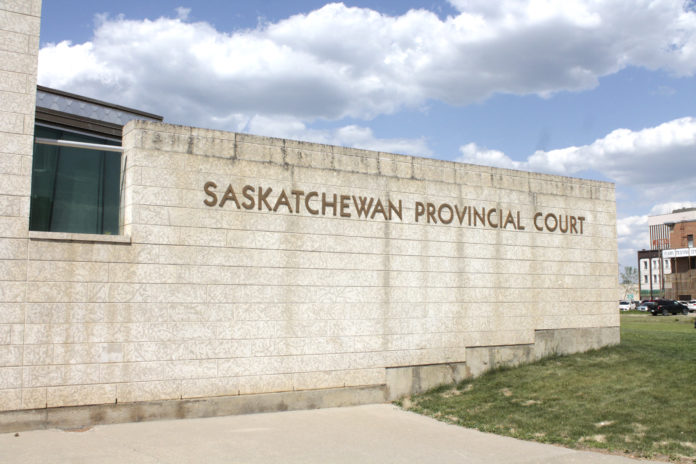A Prince Albert woman told the court Wednesday that a recent arrest for impaired driving had helped her turn her life around.
Krystle Sundara appeared in provincial court Wednesday for sentencing on charges of impaired driving and fraudulently obtaining food and beverage. The charges related to a 2018 incident in Saskatoon where Sundara, identified in police reports as Krystle Viglas, went on an afternoon of drinking. Police said she visited two bars, one on Broadway Avenue and another on Diefenbaker Drive, starting around 4:30 p.m., and left both businesses without paying her “hefty tab.”
Employees told police she also left behind her purse and identification at the first bar and her shoes at the second. She was shoeless when she was arrested, police indicated.
Officers found Sundara at 11th Street and Avenue W, where she had crashed her black Mercedes into a fence after allegedly leaving the scene of a hit and run on Circle Drive. No one was injured in either crash.
Sundara was also charged with driving while disqualified. She had her license taken away after a previous impaired driving conviction.
The Crown was seeking six months of prison, followed by 12 months of probation and a five-year driving ban, citing factors such as ongoing struggles with addiction, negative social influences and lack of employment prospects as evidence that she was at a “high risk” to re-offend. Sundara’s three previous impaired driving convictions were also cited by the Crown.
Sundara, who represented herself, argued for a curative discharge, a form of conditional discharge available to people charged with impaired driving who demonstrate a willingness to change and a likelihood of treatment success.
In the months since the collision, Sundara said, she has joined narcotics anonymous (NA) and alcoholics anonymous and has gotten clean. She has left her abusive husband, cut people out of her life who use drugs and alcohol and has been hired full time in a dental office.
She said she started drinking at 13 or 14 and was a full-fledged alcoholic by the time she turned 19. When she was 17, she got pregnant. She lost her son to the custody of her first husband because of her drinking. Eventually, she also turned to cocaine.
About six months before the most recent DUI, Sundara said, she attempted to seek treatment for addictions but faced resistance from her husband.
When she was arrested for her bar-hopping afternoon in Saskatoon, she knew she needed help. She began to go to meetings every night, but her husband resisted. Once, she testified, when he saw she had been attending the NA meetings despite is objections, he beat her up.
That’s when she decided to leave him, a decision she didn’t take lightly, as it left her financially “screwed.”
Since then, she has been living with other people in recovery.
She rejected assertions from the Crown that seeking help was only about avoiding prison time.
“I don’t want to go back to that miserable life,” Sundara said through tears on the witness stand.
“My life has totally changed. I don’t want to live like that anymore.”
Getting clean, living independently and working full-time was something that even a few months ago, Sundara would have thought impossible.
“I live recovery now.”
The Crown asked Sundara why this time was different. She questioned whether Sundara was really dedicated, after three prior impaired driving convictions.
“I wasn’t ready”,” Sundara said of her past admission to the impaired driver treatment program.
“I lived with people. I surrounded myself with the lifestyle. I didn’t want to leave it all behind. Now, I want it. I’m 35 years old. It’s time to grow up and be a better person.”
Three witnesses, including Sundara’s addictions counselor, her NA sponsor and the NA group facilitator, corroborated parts of her story.
Sundara’s counsellor said that while she is in the early stages of recovery, she has developed a “strong system” of support and a “good foundation of recovery.”
He testified that she is not at risk of relapse and that there “is a high motivation” for her to continue to work on remaining sober.
Sundara’s NA sponsor and her facilitator testified that she is “very motivated,” to stay sober. “If she continues to do what she’s been doing, she would be successful,” the facilitator said.
With the testimony, Judge Daunt was convinced that the concerns raised in the pre-sentence report had been addressed. She imposed a curative discharge followed by an 18-month probation order. She also ordered a four-year driving prohibition, and a six-month ban before Sundara could apply for the ignition interlock program.
Sundara has also been banned from bars and liquor stores, or from possessing or consuming drugs or alcohol. She has been under those same conditions since making bail last year.
“I am quite confident you are sincere,” Daunt told Sundara, noting that she had zero breaches since being placed under a recognizance order in October.
“Just keep doing what you’re doing. Congratulations on what you’ve done. It must have been a lot of hard work.”
— With files from Bre McAdam, Saskatoon StarPhoenix


